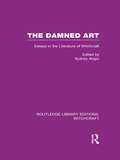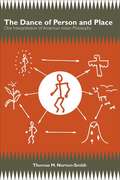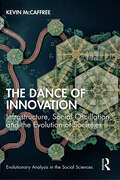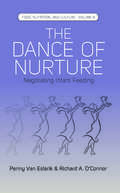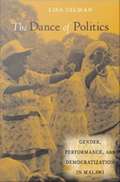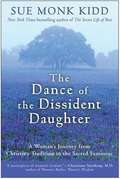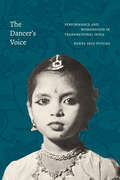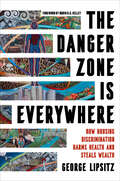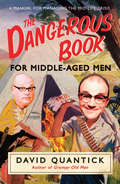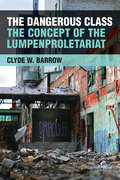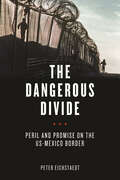- Table View
- List View
The Dame in the Kimono: Hollywood, Censorship, and the Production Code
by Leonard J. Leff Jerold L. Simmons“This excellent, lively study examines the ‘raucous debate’ sparked by the Code over the morals and ideals of American movies.” —Publishers WeeklyThe new edition of this seminal work takes the story of the Production Code and motion picture censorship into the present, including the creation of the PG-13 and NC-17 ratings in the 1990s.Starting in the early 1930s, the Production Code Director, Joe Breen, and his successor, Geoff Shurlock, understood that American motion pictures needed enough rope—enough sex, and violence, and tang—to lasso an audience, and not enough to strangle the industry. To explore the history and implementation of the Motion Picture Production Code, this book uses 11 movies: Dead End, GoneWith the Wind, The Outlaw, The Postman Always Rings Twice, The Bicycle Thief, Detective Story, A Streetcar Named Desire, The Moon Is Blue, The French Line, Lolita, and Who’s Afraid of Virginia Woolf? The authors combine a lively style with provocative insights and a wealth of anecdotes to show how the code helped shape American screen content for nearly 50 years.“A readable, intimate account of the rise to near-tyrannical power, and the fall to well-deserved ignominy, of the old Production Code Administration.” —Atlantic Monthly“A valuable insight into our own innocence and naiveté.” —The New York Times Book Review“The triumph of Leff and Simmons’s fine work is that they have reminded us of how fatuous and inimical a code of conduct can be: how tempting it is as a theoretical answer, and how intrinsically flawed it is as a working solution.” —The Times of London
The Damned Art: Essays in the Literature of Witchcraft (Routledge Library Editions: Witchcraft)
by Sydney AngloThis book approaches witchcraft and demonology through literary records. The works discussed deal with the contemporary theories propounded by those who sought either to justify, or to refute persecution. Eight contributors of differing interests,a nd with different approaches to their subject, examine a selection of important, representative witchcraft texts – published in England, France, Germany, Italy and America – setting them within their intellectual context and analysing both their style and argument.
The Dance Of Person And Place
by Thomas M. Norton-SmithEver since first contact with Europeans. American Indian stories about how the world is have been regarded as interesting objects of study, but also as childish and savage, philosophically curious and ethically monstrous. Using the writings of early ethnographers and cultural anthropologists, early narratives told or written by Indians, and scholarly work by contemporary Native writers and philosophers, Shawnee philosopher Thomas M. Norton-Smith develops a rational reconstruction of American Indian philosophy as a dance of person and place. He views Native philosophy through the lens of a culturally sophisticated constructivism grounded in the work of contemporary American analytic satisfying certain criteria construct actual worlds---words make worlds. Ultimately, Norton-Smith argues that the Native ways of organizing experiences with spoken words and other performances construct real worlds as robustly as their Western counterparts. and, in so doing, he helps to bridge the chasm between Western and American Indian philosophical traditions.
The Dance That Makes You Vanish: Cultural Reconstruction in Post-Genocide Indonesia (Difference Incorporated)
by Rachmi Diyah LarasatiIndonesian court dance, a purportedly pure and untouched tradition, is famed throughout the world for its sublime calm and stillness. Yet this unyieldingly peaceful surface conceals a time of political repression and mass killing. Between 1965 and 1966, some one million Indonesians—including a large percentage of the country&’s musicians, artists, and dancers—were killed, arrested, or disappeared as Suharto established a virtual dictatorship that ruled for the next thirty years. In The Dance That Makes You Vanish, an examination of the relationship between female dancers and the Indonesian state since 1965, Rachmi Diyah Larasati elucidates the Suharto regime&’s dual-edged strategy: persecuting and killing performers perceived as communist or left leaning while simultaneously producing and deploying &“replicas&”—new bodies trained to standardize and unify the &“unruly&” movements and voices of those vanished—as idealized representatives of Indonesia&’s cultural elegance and composure in bowing to autocratic rule. Analyzing this history, Larasati shows how the Suharto regime&’s obsessive attempts to control and harness Indonesian dance for its own political ends have functioned as both smoke screen and smoke signal, inadvertently drawing attention to the site of state violence and criminality by constantly pointing out the &“perfection&” of the mask that covers it.Reflecting on her own experiences as an Indonesian national troupe dancer from a family of persecuted female dancers and activists, Larasati brings to life a powerful, multifaceted investigation of the pervasive use of culture as a vehicle for state repression and the global mass-marketing of national identity.
The Dance of Freedom: Texas African Americans during Reconstruction
by Barry A. CrouchThis anthology brings together the late Barry A. Crouch's most important articles on the African American experience in Texas during Reconstruction. Grouped topically, the essays explore what freedom meant to the newly emancipated, how white Texans reacted to the freed slaves, and how Freedmen's Bureau agents and African American politicians worked to improve the lot of ordinary African American Texans. The volume also contains Crouch's seminal review of Reconstruction historiography, "Unmanacling Texas Reconstruction: A Twenty-Year Perspective." The introductory pieces by Arnoldo De Leon and Larry Madaras recapitulate Barry Crouch's scholarly career and pay tribute to his stature in the field of Reconstruction history.
The Dance of Innovation: Infrastructure, Social Oscillation, and the Evolution of Societies (Evolutionary Analysis in the Social Sciences)
by Kevin McCaffreeFew of us, amidst our daily chores and responsibilities, consider how mundane infrastructures—from electrical grids to sewage systems—have developed over millennia in ways that enable everything we cherish, from democracy to technological innovation to individual liberty. But what drives the evolution of this infrastructure? And why is infrastructure so critical to human flourishing? In this book, the most innovative and interdisciplinary study of cultural evolution ever produced, new concepts are explored, new histories are brought into contact and new ground-breaking insights are defended. What makes creativity unique in human societies is not only our capacity to generate and modify our diverse individual intuitions about the social and physical world, but also our capacity to form and leave groups fluidly in a dancing rhythm of oscillation across the expanse of history. This book walks the reader carefully through these processes, with clear concepts and an approachable writing style.
The Dance of Life: The New Science of How a Single Cell Becomes a Human Being
by Roger Highfield Magdalena Zernicka-GoetzA renowned biologist's cutting-edge and unconventional examination of human reproduction and embryo research Scientists have long struggled to make pregnancy easier, safer, and more successful. In The Dance of Life, developmental and stem-cell biologist Magdalena Zernicka-Goetz takes us to the front lines of efforts to understand the creation of a human life. She has spent two decades unraveling the mysteries of development, as a simple fertilized egg becomes a complex human being of forty trillion cells. Zernicka-Goetz's work is both incredibly practical and astonishingly vast: her groundbreaking experiments with mouse, human, and artificial embryo models give hope to how more women can sustain viable pregnancies. Set at the intersection of science's greatest powers and humanity's greatest concern, The Dance of Life is a revelatory account of the future of fertility -- and life itself.
The Dance of Nurture: Negotiating Infant Feeding (Food, Nutrition, and Culture #6)
by Penny Van Esterik Richard A. O'ConnorBreastfeeding and child feeding at the center of nurturing practices, yet the work of nurture has escaped the scrutiny of medical and social scientists. Anthropology offers a powerful biocultural approach that examines how custom and culture interact to support nurturing practices. Our framework shows how the unique constitutions of mothers and infants regulate each other. The Dance of Nurture integrates ethnography, biology and the political economy of infant feeding into a holistic framework guided by the metaphor of dance. It includes a critique of efforts to improve infant feeding practices globally by UN agencies and advocacy groups concerned with solving global nutrition and health problems.
The Dance of Politics: Gender, Performance, and Democratization in Malawi
by Lisa GilmanElection campaigns, political events, and national celebration days in Malawi usually feature groups of women who dance and perform songs of praise for politicians and political parties. These lively performances help to attract and energize throngs of prospective voters. <p><p> However, as Lisa Gilman explains, “praise performing” is one of the only ways that women are allowed to participate in a male-dominated political system. Although political performances by women are not unique to Malawi, the case in Malawi is complicated by the fact that until 1994 allMalawianwomen were required to perform on behalf of the long-reigning political party and its self-declared “President for Life,” Dr. Hastings Kamuzu Banda+. <p> This is the first book to examine the present-day situation, where issues of gender, economics and politics collide in surprising ways. Along with its solid grounding in the relevant literature, The Dance of Politics draws strength from Gilman’s first-hand observations and her interviews with a range of participants in the political process, from dancers to politicians.
The Dance of the Dissident Daughter: A Woman's Journey from Christian Tradition to the Sacred Feminine
by Sue Monk KiddThis is a wonderful story of Kidd's discovery of her self worth and the long history of women and spirituality. Though she addresses difficult issues, she maintains her faith and her marriage, strengthening both by strengthening herself and her understanding of the sacred feminine.
The Dancer's Voice: Performance and Womanhood in Transnational India
by Rumya Sree PutchaIn The Dancer’s Voice Rumya Sree Putcha theorizes how the Indian classical dancer performs the complex dynamics of transnational Indian womanhood. Putcha argues that the public persona of the Indian dancer has come to represent India in the global imagination—a representation that supports caste hierarchies and Hindu ethnonationalism, as well as white supremacist model minority narratives. Generations of Indian women have been encouraged to embody the archetype of the dancer, popularized through film cultures from the 1930s to the present. Through analyses of films, immigration and marriage laws, histories of caste and race, advertising campaigns, and her own family’s heirlooms, photographs, and memories, Putcha reveals how women’s citizenship is based on separating their voices from their bodies. In listening closely to and for the dancer’s voice, she offers a new way to understand the intersections of body, voice, performance, caste, race, gender, and nation.
The Dancing Girls of Lahore: Selling Love and Hoarding Dreams in Pakistan's Ancient Pleasure District
by Louise BrownThe dancing girls of Lahore inhabit the Diamond Market in the shadow of a great mosque. The twenty-first century goes on outside the walls of this ancient quarter but scarcely registers within. Though their trade can be described with accuracy as prostitution, the dancing girls have an illustrious history: Beloved by emperors and nawabs, their sophisticated art encompassed the best of Mughal culture. The modern-day Bollywood aesthetic, with its love of gaudy spectacle, music, and dance, is their distant legacy. But the life of the pampered courtesan is not the one now being lived by Maha and her three girls. What they do is forbidden by Islam, though tolerated; but they are gandi, "unclean," and Maha's daughters, like her, are born into the business and will not leave it. Sociologist Louise Brown spent four years in the most intimate study of the family life of a Lahori dancing girl. With beautiful understatement, she turns a novelist's eye on a true story that beggars the imagination. Maha, a classically trained dancer of exquisite grace, had her virginity sold to a powerful Arab sheikh at the age of twelve; when her own daughter Nena comes of age and Maha cannot bring in the money she once did, she faces a terrible decision as the agents of the sheikh come calling once more.
The Dancing Girls of Lahore: Selling Love and Saving Dreams in Pakistan's Pleasure District
by Louise BrownAn unforgettable and compassionate look at the lives of the residents of Lahore’s pleasure districtThe Dancing Girls of Lahore inhabit the Diamond District in the shadow of a great mosque. The 21st century goes on outside the walls, this ancient quarter, but scarcely registers within. Though their trade can be described with accuracy as prostitution, the dancing girls have an illustrious history: beloved by sultans, their sophisticated art encompassed the best of Mughal culture. The modern day Bollywood aesthetic, with its love of gaudy spectacle, music, and dance, is their distant legacy. But the life of the pampered courtesan is not the one now being lived by Maha and her three girls. What they do is forbidden by Islam, though tolerated; but they are, unclean, and Maha’s daughters, like her, are born into the business and will not leave it. Sociologist Louise Brown spent four years in the most intimate study of the family life of one Lahori courtesan. Beautifully understated, it turns a novelist’s eye on a true story that beggars the imagination. Maha, at fourteen a classically trained dancer of exquisite grace, had her virginity sold to the Sultan of Dubai; when her own daughter Nena comes of age and Maha cannot bring in the money she once did, she faces a terrible decision as the agents of the Sultan come calling once more.
The Dancing Goddesses: Folklore, Archaeology, and the Origins of European Dance
by Elizabeth Wayland BarberA fascinating exploration of an ancient system of beliefs and its links to the evolution of dance. From southern Greece to northern Russia, people have long believed in female spirits, bringers of fertility, who spend their nights and days dancing in the fields and forests. So appealing were these spirit-maidens that they also took up residence in nineteenth-century Romantic literature. Archaeologist and linguist by profession, folk dancer by avocation, Elizabeth Wayland Barber has sleuthed through ethnographic lore and archaeological reports of east and southeast Europe, translating enchanting folktales about these "dancing goddesses" as well as eyewitness accounts of traditional rituals--texts that offer new perspectives on dance in agrarian society. She then traces these goddesses and their dances back through the Romans and Greeks to the first farmers of Europe. Along the way, she locates the origins of many customs, including coloring Easter eggs and throwing rice at the bride. The result is a detective story like no other and a joyful reminder of the human need to dance.
The Dancing Horses of Acoma, And Other Acoma Indian Stories
by Wolf Robe HuntThe Dancing Horses of Acoma, and Other Acoma Indian Stories by Wolf Robe Hunt and Helen Rushmore is a captivating collection of tales that bring to life the rich cultural heritage and storytelling traditions of the Acoma Pueblo. Drawing from Native American folklore, history, and legend, this book offers readers a glimpse into the timeless wisdom, creativity, and spirituality of the Acoma people.The centerpiece of the collection, The Dancing Horses of Acoma, tells the enchanting story of magical horses whose extraordinary movements and grace capture the hearts of those who witness them. Alongside this tale are other stories that explore themes of community, respect for nature, and the interplay between the human and spiritual worlds.Each story is told with vivid imagery and a deep respect for the cultural origins of the narratives, reflecting the values and traditions of the Acoma Pueblo. From heroic deeds and mystical encounters to moral lessons and everyday life, the collection celebrates the vibrancy and resilience of Native American storytelling.Accompanied by evocative illustrations, this book is a treasure for readers of all ages who are interested in Indigenous cultures, folklore, and the power of storytelling. The Dancing Horses of Acoma, and Other Acoma Indian Stories is both a tribute to the Acoma people and an invitation to explore the enduring legacy of their oral traditions.
The Danger Imperative: Violence, Death, and the Soul of Policing
by Michael Sierra-ArévaloPolicing is violent. And its violence is not distributed equally: stark racial disparities persist despite decades of efforts to address them. Amid public outcry and an ongoing crisis of police legitimacy, there is pressing need to understand not only how police perceive and use violence but also why.With unprecedented access to three police departments and drawing on more than 100 interviews and 1,000 hours on patrol, The Danger Imperative provides vital insight into how police culture shapes officers’ perception and practice of violence. From the front seat of a patrol car, it shows how the institution of policing reinforces a cultural preoccupation with violence through academy training, departmental routines, powerful symbols, and officers’ street-level behavior.This violence-centric culture makes no explicit mention of race, relying on the colorblind language of “threat” and “officer safety.” Nonetheless, existing patterns of systemic disadvantage funnel police hyperfocused on survival into poor minority neighborhoods. Without requiring individual bigotry, this combination of social structure, culture, and behavior perpetuates enduring inequalities in police violence.A trailblazing, on-the-ground account of modern policing, this book shows that violence is the logical consequence of an institutional culture that privileges officer survival over public safety.
The Danger Zone Is Everywhere: How Housing Discrimination Harms Health and Steals Wealth (American Crossroads #73)
by George LipsitzCompellingly argues that good health is as much social as it is biological, and that the racial health gap and the racial wealth gap are mutually constitutive. The Danger Zone Is Everywhere shows that housing insecurity and the poor health associated with it are central components of an unjust, destructive, and deadly racial order. Housing discrimination is a civil and economic injustice, but it is also a menace to public health. With this book, George Lipsitz reveals how the injuries of housing discrimination are augmented by racial bias in home appraisals and tax assessments, by the disparate racialized effects of policing, sentencing, and parole, and by the ways in which algorithms in insurance and other spheres associate race with risk. But The Danger Zone Is Everywhere also highlights new practices emerging in health care and the law, emphasizing how grassroots community mobilizations are creating an active and engaged public sphere constituency promoting new forms of legislation, litigation, and organization for social justice.
The Dangerous Book for Boys
by Conn Iggulden Hal IgguldenEqual parts droll and gorgeous nostalgia book and heartfelt plea for a renewed sense of adventure in the lives of boys and men, Conn and Hal Iggulden's The Dangerous Book for Boys became a mammoth bestseller in the United Kingdom in 2006. Adapted, in moderation, for American customs in this edition (cricket is gone, rugby remains; conkers are out, Navajo Code Talkers in), The Dangerous Book is a guide book for dads as well as their sons, as a reminder of lore and technique that have not yet been completely lost to the digital age. Recall the adventures of Scott of the Antarctic and the Battle of the Somme, relearn how to palm a coin, tan a skin, and, most charmingly, wrap a package in brown paper and string. The book's ambitions are both modest and winningly optimistic: you get the sense that by learning how to place a splint or write in invisible ink, a boy might be prepared for anything, even girls (which warrant a small but wise chapter of their own).
The Dangerous Book for Middle-Aged Men: A Manual for Managing Mid-Life Crisis
by David QuantickSo your husband/boyfriend/partner (delete as necessary) has just tipped over 35/40/45/50 (delete as necessary) and you can see that he's not quite as keen on Emmerdale as he once was. He's started to dress with his jeans hoiked too high like his hero Jeremy Clarkson and he's bought a home gym - the one recommended by George Clooney. Then there are those Harley Davison brochures delivered in brown envelopes. You've noticed he's started pulling in his beer gut when he's talks to his teenage secretary. And why have his grey sideburns turned that browny black? That's a sure sign of hair dye. And then you stumble into the bathroom in the morning and he's got his hands in a jar of your face cream. LADIES BEWARE!That dangerous age has arrived. It's the male menopause. The mid-life crisis. The time when suddenly you find your partner has put a whole Scalextrix track in your attic without you noticing. He's bought an electric guitar and insists on playing 'Smoke On The Water 'to the cat at all hours. It that time when no matter what you say they suddenly don't mind making a fools of themselves. They come home almost every week with a new enthusiasm. Dangerous Men don't just cook - they COOK. With truffles, that cost £210 for one the size of a wrinkled scrotum, and have to be from the right region of France. And they must be served with a side order of blowfish, because you saw that in a James Bond DVD that came free with the Mail on Sunday.
The Dangerous Class: The Concept of the Lumpenproletariat
by Clyde BarrowMarx and Engels’ concept of the “lumpenproletariat,” or underclass (an anglicized, politically neutral term), appears in The Communist Manifesto and other writings. It refers to “the dangerous class, the social scum, that passively rotting mass thrown off by the lowest layers of old society,” whose lowly status made its residents potential tools of the capitalists against the working class. Surprisingly, no one has made a substantial study of the lumpenproletariat in Marxist thought until now. Clyde Barrow argues that recent discussions about the downward spiral of the American white working class (“its main problem is that it is not working”) have reactivated the concept of the lumpenproletariat, despite long held belief that it is a term so ill-defined as not to be theoretical. Using techniques from etymology, lexicology, and translation, Barrow brings analytical coherence to the concept of the lumpenproletariat, revealing it to be an inherent component of Marx and Engels’ analysis of the historical origins of capitalism. However, a proletariat that is destined to decay into an underclass may pose insurmountable obstacles to a theory of revolutionary agency in post-industrial capitalism. Barrow thus updates historical discussions of the lumpenproletariat in the context of contemporary American politics and suggests that all post-industrial capitalist societies now confront the choice between communism and dystopia.
The Dangerous Divide: Peril and Promise on the US-Mexico Border
by Peter EichstaedtHow do we balance border security and America's need for a vital workforce while continuing to provide access to the American dream? Since the attacks of 9/11, the United States has steadily ramped up security along the U.S.-Mexico border, transforming America's legendary Southwest into a frontier of fear. Veteran journalist Peter Eichstaedt roams this fabled region from Tucson, Arizona, to El Paso, Texas, meeting with migrants, border security advocates, and communities ravaged by cross-border crime. He rides with the border patrol and reveals the tragic situation that has evolved along the border. Eichstaedt finds that despite tens of thousands of border agents and the expenditure of billions of dollars, an estimated one million Mexicans and Central Americans continue to cross the border each year. These migrants fill jobs that have become the underpinnings of the U.S. economy. Rather than building more and better barricades, Eichstaedt argues that the United States must reform its immigration and drug laws and acknowledge that costly, counterproductive, and antiquated policies have created deadly circumstances on both sides of the border. Recognizing the truth of America's long and tortured relations with Mexico must be followed by legitimizing the contributions made by migrants to the American way of life.
The Dangerous Lives of Public Performers
by Anthony ShayExamining performers from the ancient Mediterranean world to the modern Islamic Middle East, including India and Pakistan, Shay explores the careers, artistic performances, and legacies of these individuals who were forced to produce entertainment and art for, and have sex with, any and all patrons.
The Dangerous Sex: The Myth of Feminine Evil (Routledge Revivals)
by Hoffman R HaysFirst published in 1966, The Dangerous Sex shows how the irrational concept of the "dangerous sex" evolved and how it was – and is – used by man to maintain his dominance. He examines sexual practices and beliefs, marriage customs and rituals, and social behaviour in every society and every age from pre-historic times to the present day. The result is a revealing picture of the deep-seated male hostility that generates the way of the sexes and has fed it throughout human history. It is also a blazing indictment of this ingrained psycho-social pattern, as it unconsciously destroys and disrupts huge areas of human happiness. In this enquiry into misogyny, H. R. Hays suggests that men must face their own compulsions before a true and balanced relation between the sexes is achieved. This book therefore throws a new light on the problems of feminism, the feminine mystique and the whole controversy concerning the place of women in society, and will be of interest to students of literature, gender studies, anthropology and psychology.
The Dangers of Gifts from Antiquity to the Digital Age (Routledge Studies in Cultural History #120)
by Tracey A. Sowerby Alexandra Urakova Tudor SalaThis is the first volume that examines dangerous gift-giving across centuries and disciplines. Bringing to the fore the subject that features as an aside in gift studies, it offers new insights into the ambivalent and troubled history of gift-giving. Dangerous, violent, and self-destructive gift-giving remains an alluring challenge for scholars almost a hundred years after Marcel Mauss’s landmark work on the gift. Globally, the notion of toxic and fateful gifts has haunted mythologies, folklores, and literatures for millennia. This book problematizes what stands behind the notion of the 'dangerous gift' and demonstrates how this operational term may help us to better understand the role and place of gift-giving from antiquity to the present through a series of case studies ranging from ancient Zoroastrianism to modern digital dating. The book develops a complex historical, cross-cultural, and multi-disciplinary approach to gift-giving that invites comparisons between various facets of this phenomenon through time and across societies. The book will interest a wide range of scholars working in anthropology, history, literary criticism, religious studies, and contemporary digital culture. It will primarily appeal to university educators and researchers of political culture, pre-modern religion, social relations, and the relationship between commerce and gifts.
The Dangers of Ritual: Between Early Medieval Texts and Social Scientific Theory
by Philippe BucCentral to current understandings of medieval history is the concept of political ritual, encompassing events from coronations to funerals, entries into cities, civic games, banquets, hunting, acts of submission or commendation, and more. ''Ritual?'' asks Philippe Buc. In The Dangers of Ritual he boldly argues that the concept shouldn't be so central after all. Modern-day scholars, gently seduced by twentieth-century theories of ritual, often misinterpret medieval documents that ostensibly describe such events, in part because they fail to appreciate the intentions behind them.The book begins with four case studies whose arrangement--backward from texts on tenth-century kingship to fourth-century representations of Christian martyrdom--allows for the line of development to be peeled back layer by layer. It then turns to an analysis of the formation of the intellectual traditions that contemporary historians have employed to interpret medieval documents. Tracing the emergence of the concept of ritual from the Reformation to the mid-twentieth century, Buc highlights the continuities yet also the profound transformations between the early medieval understandings and our own, social-scientific models.Medieval historians will find this book an indispensable resource for its insights into methodological issues crucial to their discipline. As Buc demonstrates, only rigorous attention to the contexts within which authors worked can allow us to reconstruct from medieval documents how ''rituals'' might have functioned. Ultimately, he argues, too swift an application of contemporary models to highly complex textual artifacts blinds us to the specificities of early medieval European political culture.

